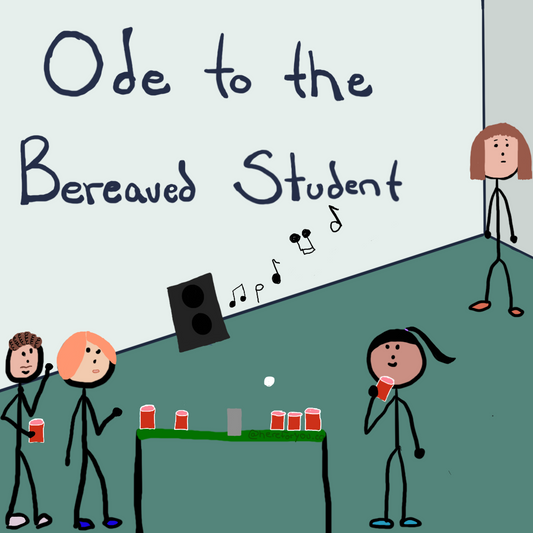I come from a long line of fastidious thank you card writers. My grandmother once questioned me about why my husband didn’t write her a thank you card for the thank you card she sent him for a gift he gave her (were you able to keep that straight?). I was one of these people. I sent my thank you cards out quickly. Usually within 24 hours, and for my wedding all thank yous were mailed within two weeks. I have a mental list of all the people who didn't send me a thank you card when social etiquette called for them to send me one. I even save thank you cards that I receive.
But — I no longer send thank you cards.

But if I were sending thank you cards right now, I'd totally send this one.
I can’t write them for kindness shown to me when my sister died, and I can't write them for kindness that has nothing to do with my dead sister. I have no interest in expressing thanks, even though I often feel thankful. I think part of it is that a generic thank you card can be superficial. Kind of like asking, “how are you?” in passing. There’s no rule that says that it must be this way, but thank you cards, or at least my thank you cards, often ooze joy with a sprinkle of happiness and the content doesn’t go far under the surface. I am still not ready to return to living life as a normal person, and writing a thank you card is something I can’t manage. I don’t want to fake it.
I also have a hard time sending thanks to people who have been supportive since my sister died. Part of the paralysis is due to the enormity of that task. Telling someone how thankful you are for support during the hardest time of your life requires a certain level of thoughtfulness and also time to put yourself in the headspace of confronting your grief while also being eloquent. Whether you call someone on the phone, write an email or send a card, you want to take time to do it right, and I can personally attest to generally not wanting to do anything, still, 10 months after Alison’s sudden death.
I have willingly embraced social media to help me deliver messages. In the early months I would periodically post on Facebook about how thankful I was for people’s condolences and also apologize for being out of touch. In talking with people in my family who don’t have social media accounts (yes - they’re a rare breed, but I totally admire them!), I learned that they feel even more guilt than I do because they’ve not sent any communication to many people and can’t use the virtual platform like I did. The job now seems so unbearably overwhelming.
So, one of my biggest requests to those who wish to support their friends and family is to excuse the person in crisis from giving thanks. Just because you don’t hear something does not mean that they are not thankful. Also, don't allow their silence prevent you from continuing to offer support. Continue to check in even if you are met with radio silence.
Though we don’t want to admit it, it’s hard to give up on the idea of receiving thanks. We like to think that our kindness is selfless, but a lot of the positive feelings we garner from volunteerism or giving of any kind is from the seeing/experiencing/or hearing about how grateful the recipient is for our good deed. I worked in volunteer management for a number of years and there was a lot of behind the scenes string pulling to make sure that the volunteers got the right experience from their 4 hours of work. It’s why people want to donate money to buy a cow to donate to a tribe but not to pay the nonprofit’s electric bill. I get it - I am like this too, but I am trying to let it go and I hope you will as well. But one of the unspoken rewards for offering selfless support to someone grieving is that your relationship will grow stronger. And then, when you need the same support (because statistically we all deal with a significant loss every 9 years and if you count non-death losses - like divorce, unemployment, illness, etc. it is much more frequent), most of them will be there for you.
My disclaimer to throw thank you card etiquette out of the window is a big one, especially coming from me, a descendent of the Duchess of Thank You Cards.

Alison with the Duchess (our grandmother).
I would be remiss not to mention, however, that not everyone is as thank you averse as me and some folks really appreciate the ritual of writing thank you cards during tough times. Or perhaps they appreciate having a concrete task when life is chaotic. My mother, for example, was writing her thank yous within a week or two of Alison's death. That's what she wanted to do, and all of the power to her (maybe it's a baby boomer thing?).
PS - if you could give new parents a pass on the thank you cards, that’d be great too. No one with a newborn or a newly formed family through adoption should have to write one either!
____
One of my biggest requests to those who wish to support their friends and family is to excuse the person in crisis from giving thanks. Just because you don’t hear something does not mean that they are not thankful. Also, don't allow their silence prevent you from continuing to offer support. Continue to check in even if you are met with radio silence.



1 comment
I’m struggling writing thank yous less than a month after my daughter died at age 12.